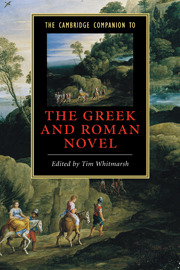10 - Politics and spectacles
from Part II - The world of the novel
Published online by Cambridge University Press: 28 June 2008
Summary
The surviving Greek and Latin novels depict a world of cities, but mostly keep Rome itself out of sight. The racy Latin novels by Petronius and Apuleius (and his Greek source) are set in the imperial present, but make few direct remarks about Rome and its emperors. The (more-or-less) chaste, idealising and nostalgic Greek novels by Chariton, Longus, Achilles Tatius and Heliodorus are mostly set in vaguely classical times, when Greek cities were still free. Nevertheless, just as historians write the story of their own times as they tell the story of the past, so too the escapist fictions of the novelists do not escape their imperial context. Some critics interpret the nostalgic setting of the Greek novels as a strategy of withdrawal. On this view, when Alexander and his successors and then Rome rule over Greece and Asia Minor, city-state gives way to empire, and the traditional work of citizenship is no longer as consequential as it once was: elite audiences are drawn to the novels' stories of individuals adrift in a chancy world. Others, by contrast, understand the nostalgic and idealistic Greek novels as an affirmation of a specifically Greek cultural identity and a celebration of the continuation of Greek civic practices after the imposition of Roman hegemony.
- Type
- Chapter
- Information
- The Cambridge Companion to the Greek and Roman Novel , pp. 162 - 182Publisher: Cambridge University PressPrint publication year: 2008
- 8
- Cited by

